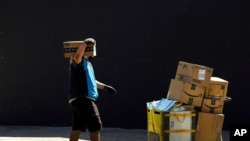More than 19,800 of Amazon’s U.S. front-line workers tested positive for the coronavirus this year, or 1.44% of its workforce, the company announced Thursday.
The world’s largest online retailer’s response to the coronavirus pandemic has been criticized by some of its staff, elected officials and unions, who said Amazon put employees at risk when it kept warehouses open during the pandemic.
However, Amazon says its employee infection rate is 42% lower than expected, given the virus' spread in the general population.
The company kept its facilities open as demand skyrocketed from shoppers staying home during pandemic lockdowns. It added temperature checks, social distancing software and other safety procedures for its workers.
According to Amazon, of its 1,372,000 Amazon and Whole Foods Market front-line workers, 19,816 tested positive for the coronavirus or were presumed to have COVID-19 between March 1 and September 19.
However, had Amazon’s rate of infection been equal to that of the general population, 33,952 workers would have gotten the virus, when taking employee age and geography into account, the company said.
Airline layoffs begin
Meanwhile, two of the world’s biggest airlines, U.S. carriers American and United, began laying off a combined 32,000 workers Thursday because of a lack of more emergency aid from the federal government. The U.S. airline industry received $25 billion in payroll support in March during the first days of the pandemic, as domestic and international travel ground to a halt.
The furloughs by American and United came the same week U.S. entertainment giant Disney announced it would lay off 28,000 workers, the majority of them at the company’s theme parks in Florida and California.
In a related matter, the U.S. Centers for Disease Control and Prevention announced Wednesday that it was extending its ban, which began in March, on passenger cruise travel until October 31. The CDC said that between March 1 and September 29, there were 3,689 cases of COVID-19 infections on cruise ships sailing in U.S. waters, including 41 deaths.
News outlets said the Trump administration overruled a recommendation by CDC Director Robert Redfield to extend the ban until February.
Madrid lockdown
Spain’s government issued limited lockdown orders Wednesday on Madrid as the country experiences a new surge of coronavirus cases.
The capital’s 3 million residents will not be allowed to venture from their homes except to go to work, school, shopping or for medical care. All bars and restaurants will be forced to close earlier than normal and reduce their seating capacity by 50%.
Health Minister Salvador Illa told reporters the restrictions would apply to municipalities with at least 100,000 inhabitants each, which would also affect nine municipalities surrounding the Spanish capital.
Europe is experiencing a steady rise of new COVID-19 infections, with Spain leading the way with about 300 infections per 100,000 inhabitants. But the rate is more than double in the Madrid region, which stands at more than 780 infections per 100,000.
The new restrictions have been denounced by Madrid’s right-wing regional government, with regional health minister Enrique Ruiz Escudero accusing the national Socialist-led government of interfering in the region’s handling of the pandemic. Madrid’s regional government, along with Catalonia and three other conservative-ruled regions, rejected the new restrictions.
Spain has more than 31,000 COVID-19 deaths, the fourth-highest tally in Europe behind Britain, Italy and France.
New Israeli restrictions
In Israel, lawmakers Wednesday approved a bill that limits Israelis from holding demonstrations more than 1 kilometer from their homes. Supporters of the bill said it was aimed at curbing the country’s growing number of COVID-19 infections, which prompted Prime Minister Benjamin Netanyahu to impose a second nationwide lockdown last week.
But others said the measure was an attempt to end the mass weekly protests staged near Netanyahu’s official residence in Jerusalem for the past several months.
The protesters have demanded the prime minister’s resignation over his handling of the pandemic and allegations of corruption. Netanyahu is currently on trial in three separate cases for bribery, fraud and other official misconduct charges.





